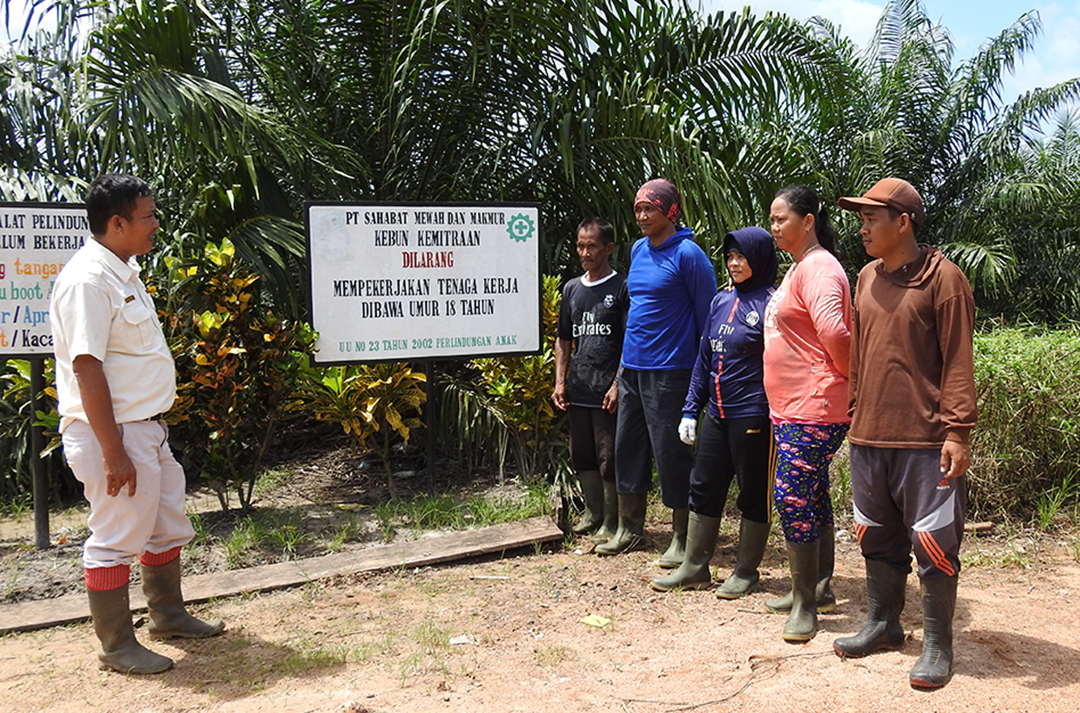
Sustainability
Smallholder Empowerment

Smallholders Empowerment is a requirement of our Responsible Development Concept. Our efforts for smallholder empowerment can be categorized as follows:
- Empowerment of smallholders in relation to palm oil business:
- to supply fresh-fruit-bunch from their independent smallholder plantation
- to provide services, including construction of simple plantation infrastructure, FFB (fresh fruit bunch) transportation services
- Empowerment of smallholders in relation to other food products to secure food security
- Empowerment of smallholders or surrounding communities to generate income that promote protection of nature, such as ecotourism
Please click the following link for more details about our socio-economic empowerment programs.
The inclusion of small-scale, independent farmers in our supply chain is consistent with our commitment to generate positive, sustainable impacts for local stakeholders. About 29% of our oil palm FFB are supplied from independent third-party suppliers (smallholders/outgrowers), and 5% are from plasma or kemitraan farmers, while the remaining 66% are sourced from our own estates.
We have strong partnerships with smallholders under the plasma or kemitraan schemes and with individual smallholder farmers, involving more than 4,100 farmers in 2022. We differentiate between plasma scheme and kemitraan scheme. The plasma scheme is our obligation to allocate 20% of our developed plantation area to surrounding communities, while the kemitraan scheme is a voluntary program, usually initiated by several independent smallholders that come to us to obtain agronomic advice and other oil palm plantation management best practice. These independent farmers may also ask our assistance to obtain bank financing. If the bank requires us to act as their bank loan guarantor, we usually have an off-take agreement for their FFB.
We partner with a total of 12 palm plantation cooperatives and village-owned enterprises in our plasma and partnership programs across all our operations. Our programs support scheme smallholders by:
- Providing support to all 12 out 12 (or 100%) scheme smallholder cooperatives to develop and operate the plasma and partnership plantations following good agricultural practices, sustainability standards, and ANJ best practices. In addition, all of our scheme smallholder plantations are managed by ANJ.
- Providing support to all 12 scheme smallholder cooperatives to obtain RSPO certification by 2025 (as of 31 December 2022, 75% have been certified by RSPO) and all independent smallholders to obtain RSPO certification by 2030.
- Distributing Rp 1.17 billion (approx. USD 78,000) as revenue premium from RSPO-certified palm products to a total of 1,812 farmers from seven RSPO-certified cooperatives in 2022.
In addition, we also participate in the Palm Oil Fund Management Agency (Badan Pengelola Dana Perkebunan Kelapa Sawit or BPDPKS) program for the replanting of 90 independent palm oil smallholders in an area of 150.5 ha in two villages in North Sumatra. We assist these farmers to get funding from BPDPKS and to apply best agronomy practices in their replanting program. These farmers currently do not supply any FFB to us as their plantation is immature.
Besides sourcing from scheme (plasma and kemitraan program) and independent smallholder farmers to supply FFB, we also have a diversification program for smallholders in our other business units (sago and edamame business units) and within our palm oil business units to strengthen food security and meet Sustainable Development Goals in villages surrounding our area of operations.
As a part of our smallholders development program, we have conducted 67 independent smallholder engagement initiatives to raise awareness about sustainability issues, introduced good agricultural practices, organized knowledge sharing sessions about ESG and other subjects, and provided mentoring sessions on relevant issues for smallholders and suppliers in each location. In total, all 31 of our suppliers (representing 100% of our suppliers) that supply to our mills have attended those engagement sessions in 2021 and until the first semester of 2022. These engagement sessions have also reached a total of 590 independent smallholders, including intermediaries, which are further upstream in our suppliers’ supply chain.
In our vegetable business we work closely with independent smallholder farmers that provide fresh edamame. By December 2022, our edamame is produced by 53 individual smallholder farmers in an area of 429 hectares in Jember, East Java. Meanwhile, all our sago starch is derived from natural sago forests in West Papua from land owned by villagers under customary rights. These landowners receive payment for every sago log harvested. All the sago trees are harvested and processed by ANJAP because it is not economical for villagers to harvest the sago manually and supply them to our factory.
We strive to ensure our partnerships are mutually beneficial, improving capacities and addressing challenges. We recognize that productivity and sustainability is another area where smallholders need significant support. ANJ has developed programs and capacity building activities that address sustainability challenges. To increase organizational capacity, we support the formation of cooperatives to enable smallholders to improve their management and financial capacity. As part of our mission to promote sustainable practice in agribusiness, we invest in smallholder farmers to ensure that they can meet the requirements for RSPO certification as well as traceability requirements.
For our individual smallholder suppliers, we apply the ‘No Purchasing’ policy with prudence as we understand that a sudden halt of relationships with them might harm their livelihoods and escalate into conflict. Instead, our approach is to assist individual suppliers in complying with our requirements and encourage them to adopt sustainability principles. This will help them increase their productivity while minimizing the risk of environmental damage and social issues. In line with the national program, we have a target that, by 2030, all third-party suppliers will be in compliance with our palm oil sourcing requirements as stated in their commitment to follow our Sustainability Policy. Our action plan will be:
- To assess the compliance of each smallholder suppliers to our Sustainability Policy, especially regarding no planting in areas with inadequate legality
- To assist smallholders to follow the process made available by the Government of Indonesia to legalize their land use permit
We have the following action plans and targets to support and ensure our suppliers comply with our sustainable palm oil sourcing commitment by 2030:
- Completion of electronic traceability system implementation with traceability level of more than 99% (2023)
- Pilot project for independent smallholders to achieve RSPO certification in the group (2023)
- Advocacy on sustainable palm oil practices and ANJ's palm oil sourcing commitment will reach 90% of our smallholders (2025)
- 100% of scheme smallholders are RSPO certified (2025)
- 100% of suppliers, including independent smallholders, comply with ANJ’s sustainable palm oil sourcing commitment (2030)
(All data accurate as of 31 December 2022)
